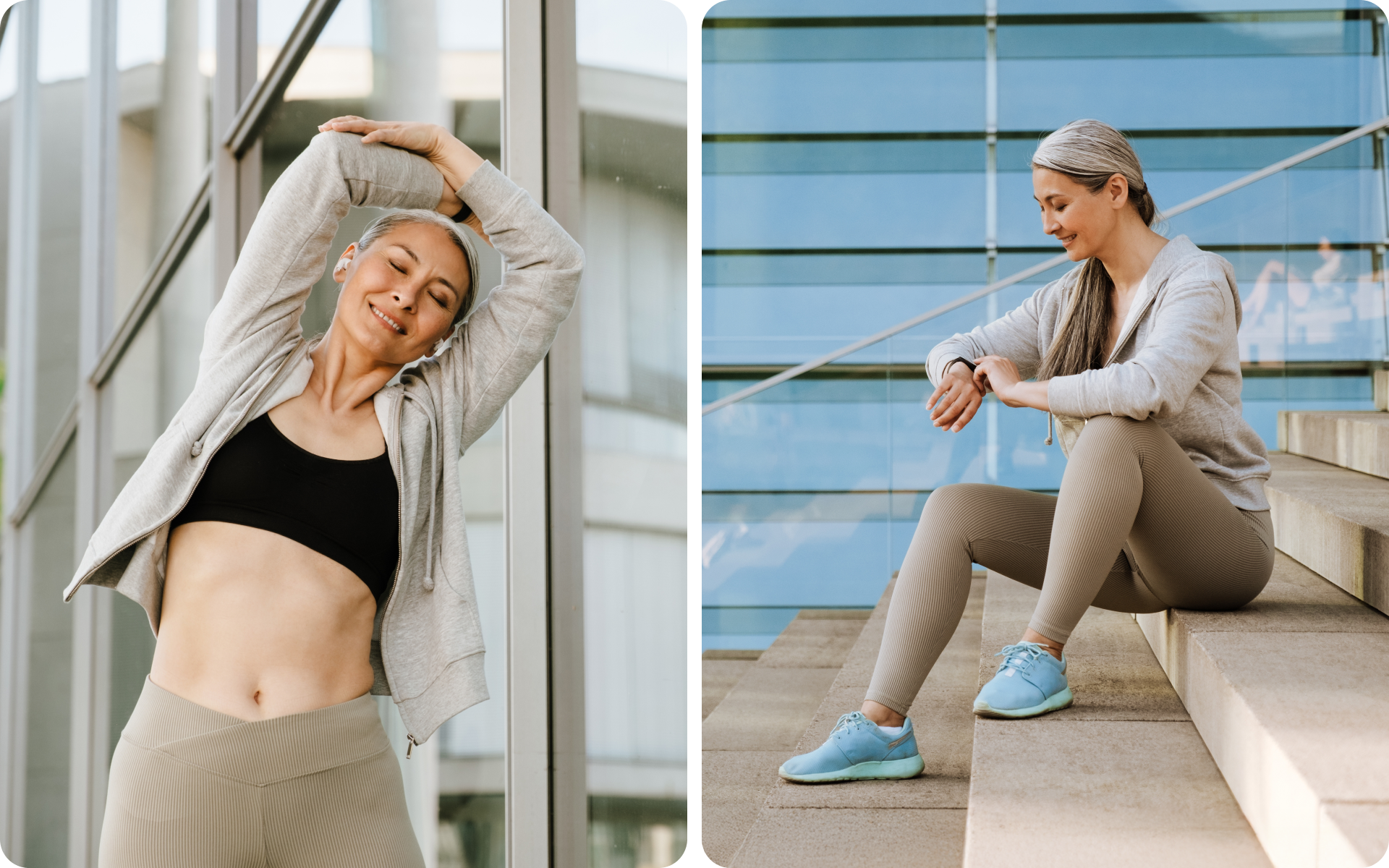Oh, how satisfying, exciting, and motivating it is to look at your scales every day and see wonderful results from your hard work when you are doing your best to lose weight! However, you can soon be knocked back down to earth when you realize that the slimming down is only noticeable from the change in your weight, not your body shape.
Shedding pounds is never an easy process, so you may feel frustrated and disappointed by the fact that although you are losing weight, you look fatter.
As most people aim to trim off a couple of inches or slim down a couple of sizes, this may lead to despair, a loss of motivation, or even cause you to give up just halfway through.
This is why it is important to understand the difference between losing weight and slimming down. Read on to find out why weight loss doesn’t equal fat loss, why you may be losing weight but looking fatter, and what you can do to fix this.
Why Doesn’t Weight Loss Equal Fat Loss?
If you are reading this, then you may have experienced what losing weight means. If you are unaware of how the process of slimming works, the key issue is that you could be losing weight but not fat. Your body weight includes the mass of your body fat and a fat-free mass, or lean body mass – your muscles, bones, organs, and water (1). A very real possibility is that when you notice you are losing weight but looking fatter, you have lost water weight, muscle mass, or both.
Fat is an essential component of your body, which performs many important functions. Body fat stores energy, protects your organs, starts various vital chemical reactions, and stockpiles essential nutrients (8).
Although body fat is essential, too much fat can lead to serious health conditions, such as obesity, diabetes, and cardiovascular diseases (4). Visceral fat – a type of fat that is accumulated around your abdominal organs – is particularly dangerous (11).
What you do want to do is start burning the excess fat along with your visceral fat, which does your body no good. You can use this body fat percentage calculator to find out how much fat you have and how much you need to burn, if indeed it exceeds the norm.
Looking for a way to break the vicious cycle of weight loss and tone up all the jiggly parts? Watch the extra pounds fly off and your muscles firm up with the BetterMe app!
Reasons Why You Are Losing Weight but Look Fatter and How to Fix That
To start burning fat and slimming down, you first need to analyze what you have done so far to shed pounds and determine what went wrong. To help you do this, here are some of the common reasons people experience this situation:
Lack of sleep
Sleep plays an incredibly important role in your health and weight loss. During sleep, your brain is preparing for the next day and your body is recovering, healing, and growing. Sleep deficiency has been linked to an increased risk of cardiovascular diseases and obesity. Just as sleep helps maintain a healthy balance between the hormones that make you feel full (leptin) and hungry (ghrelin), a lack of sleep increases ghrelin levels and lowers the leptin levels, which makes you feel hungrier than if you sleep well (6). This makes it more difficult for you to follow a diet and avoid unhealthy food cravings, ultimately adding to your body fat.
How can you fix it?
To overcome this pattern, you need to sleep more. If you have difficulty falling asleep, you could try meditation or relaxation techniques. Such practices put your mind at peace and clear away the swirling thoughts that are often the main reason for your lack of sleep. You could also try drinking a cup of warm milk or water before going to sleep. A cup of calming herbal tea is also a great option.
Water retention
Water retention occurs when your body fails to properly manage fluids. Some symptoms of this include swelling, shiny or puffy skin, and weight gain. This may occur due to hormonal imbalances, obesity, kidney problems, or a lack of physical activity. (12) When you lose weight but look fatter, there is a possibility that it is the result of swelling that is caused by water retention.
How can you fix it?
Water retention is often the result of an increased sodium intake. Sodium is essential for your body, but only up to a certain amount. Although you may feel as if you are in control of your sodium intake because you don’t use that much table salt, there are other sources of sodium in your diet, including various processed foods such as crackers, chips, canned foods, soft drinks, and fast food (12). You should try to steer clear of these salty foods and always check labels for the sodium content of a product. If reducing your intake of sodium doesn’t help, you should consult a doctor.
Loss of water weight
The previous point stated that the reason why you are losing weight but looking fatter may be due to water retention. In this case, you are losing fat, but it’s additional water that makes you appear fuller. There also is another way in which water may promote weight loss but not make you look any thinner, and that’s when you lose water weight.
As it is also part of your weight, water will be a component in the result on your scale, but will not make any noticeable changes in your figure. It will be a bit more apparent if you are already slim and want to make your muscles look more chiseled. However, if you are overweight and have lost a couple of pounds without any noticeable result, then perhaps you have only lost water weight.
How can you fix it?
Proper hydration is one of the staples of a successful weight loss campaign. Try drinking about eight glasses of water per day. Make sure to drain a glass during your workout, before going to sleep, and after waking up. Also, drastically reducing your carbohydrate intake will cause water weight loss as you use up all your stored glycogen, which has a lot of water attached to it. To avoid this, you should choose a nutritional strategy that is more moderate in healthy carbohydrates or decrease them gradually rather than all at once.
Read more: How Many Calories in a Banana? And the Secret to Losing Weight With Bananas
Drinking alcohol in excess
If you are a fan of alcohol, you may have a beer or wine belly. A round and protruding belly is not the most attractive feature. Alcohol, together with sweetened drinks and store-bought juices, are filled with empty calories. Indulging yourself with beer will ultimately lead to increased levels of visceral fat, which is incredibly difficult to get rid of (9). As abdominal fat is one of the most stubborn types of fat, you may lose weight but see no changes in the size of your belly.
How can you fix it?
You should avoid drinking empty-calorie drinks, including all the aforementioned types. If you don’t like plain water, you can drink unsweetened coffee and tea. The latter is a great option, as this promotes weight loss, and there are various types of tea, so you can conveniently change them up so you don’t get sick of them.
Increased stress levels
When you are stressed, your body releases the stress hormone cortisol, which affects your inner body with an increased amount of belly fat. This is often strikingly visible and may be one of the reasons why you are losing weight but look fatter (5). A study has shown that increased cortisol levels may cause abdominal fat depositions, even in otherwise slender women (7).
How can you fix it?
Try reducing your stress levels by avoiding stressful situations as much as possible. This sounds simple, but in reality, it may be really difficult, particularly if you get very stressed at work or at home. If you can’t avoid stressful situations, try healthy coping mechanisms such as meditation. This has proven to be highly effective for helping people relax and lowering their stress.
You can also increase your amount of physical activity, spend more time in the fresh air, and treat yourself once in a while. Take a bubble bath, go shopping, or read your favorite book – this will also help distract you and partially reduce your stress level.
Extreme calorie restriction
Some people believe that as they consume fewer calories, they will burn more fat. However, this is not true. Too small a calorie intake may even interfere with your slimming process. Why does this happen? you may ask. There are two main reasons for this. The first is that when your body notices you aren’t getting enough calories from your food, it goes into survival mode and starts using your muscle mass as an energy source and breaks it down, which results in muscle loss.
Secondly, during an extreme calorie restriction, there will be changes in your metabolic functions that will reduce the thyroid hormone, which will end up slowing down fat loss. This also increases the production of the aforementioned stress hormone cortisol, which hinders the fat burning process (13).
How can you fix it?
The recommended weight loss pace is 1-2 pounds (0.45-1 kg) a week. 1 pound of fat equals 3,500 calories, so for your caloric deficit to be healthy, you must reduce your daily caloric consumption by 500 calories (2). You can use this calories burned calculator to calculate how many calories you require daily and then subtract 500 from the result.
If you tend to let yourself off the hook, raise the white flag when things get tougher than you expected, send yourself on an unconscious binge-eating trip – BetterMe app is here to help you leave all of these sabotaging habits in the past!
Lack of exercise
Eating at a proper calorie deficit will make you lose weight, but if you think you can avoid regular exercise, don’t expect the result to be fast or impressive. A lack of exercise may make you lose weight but look fatter because if you restrict your caloric intake and don’t work your muscles, you will start losing muscle mass. In such a case, the result on your scale will show you not only how much fat you have burned, but also how much muscle mass you have lost.
How can you fix it?
Any physical exercise will involve your muscles and add to the number of burned calories. You should decide what your goal is and start working out accordingly. If you want to slim down without growing muscle mass, then resistance training and cardio may be perfect for you. If your goal is to get buff after you slim down, then strength training and weightlifting are your best options.
Lack of patience
This may seem obvious, but some people may deny or ignore it. When you work hard, you want to see results immediately. Although you may notice how the number on your scale is getting smaller, in order for your goal to be visible on your body, you should spend a significant amount of time working on yourself by putting your body in motion. You didn’t gain that fat in a week so don’t expect it to be gone in a similarly short period of time. Perhaps you are losing weight but look fatter simply because you have made an error in setting your expectations too high.
How can you fix it?
It’s important to remember that weight loss is a gradual process that requires patience. Start a journal and keep track of your progress. Write down your weight and your body measurements. This will help you stay motivated and show you your real results. Don’t give up just because you don’t see any changes in the mirror after a couple of weeks of dieting. However, if your situation doesn’t change after months of trying to lose weight, you should reconsider your weight loss means and consult a doctor.
Read more: Are Smoothies Good For Losing Weight? What Experts Say
FAQs
How can I lose weight around the waist to improve my proportions?
There are different female body types – ectomorphs have a small frame, endomorphs have a thick and wide build, and mesomorphs are believed to have the best of the previous two types. To improve their proportions, women of different body types require different approaches. As spot reduction is a myth, you must take a holistic approach by working on your entire body. If you are an endomorph and are wondering how to lose weight around your waist to improve your proportions, you need to start following a diet with a caloric deficit and a regular cardio workout plan. If you are an ectomorph and want to have a more curvaceous figure, you can try a Brazilian butt challenge to build your buttock muscles and make your waist visibly smaller. There also are exercises that are particularly effective for helping you achieve an hourglass figure, regardless of what body type you have.
How can I make my body look slimmer?
If you don’t feel like dieting or exercising but want to make your body look slimmer, here are some simple tips:
- You can make your body look slimmer with the help of certain clothes. Black clothes are known to make you look visibly thinner.
- Wear clothes with vertical stripes and avoid big patterns.
- Pick flattering clothes, rather than those that draw attention to your weak sides.
- Improving your posture may also significantly improve the way your figure looks.
- You should avoid salty food and foods that cause bloating, such as beans, lentils, Brussels sprouts, broccoli, and garlic
Why am I gaining fat but losing weight?
If your clothes feel tighter but the number on the scale is going down, this is probably because your body composition is changing. What you’re gaining isn’t fat, but muscle. This is a common occurrence when you start a new workout routine or increase the intensity of your workouts.
Weight refers to the total amount of pounds your body weighs, which includes everything from muscle and fat to bones and organs. When you start to exercise consistently, you will lose weight as your body burns fat and calories (1). However, as you continue to exercise and build muscle, the scale may not reflect a downward number as muscle weighs more than fat.
You may notice your shirts are a little tighter around the arms as your muscles have grown and become more defined. Your pants may also be tighter around the legs because your thigh muscles have grown. However, this doesn’t mean that you’re gaining fat (13).
Can losing fat make you look bigger?
Yes, losing fat can make you look bigger, particularly if you’re training specific muscle groups for more definition and size. What happens is that as you lose fat, your muscles are revealed and become more visible. As you continue to train, muscle hypertrophy (growth) occurs, which makes your muscles appear larger and more defined (10).
This is why many bodybuilders go through a “cutting” phase where they focus on losing fat before “bulking” or building muscle mass. By eliminating excess fat first, their muscles show through and give them a lean and ripped appearance (3).
How long does water retention last?
Water retention can last anything from a few days to several months, depending on the cause. Mild cases of water retention (such as bloating from PMS) may only last a few days, whereas more severe cases (such as edema or swelling due to a medical condition) can last for months. Chronic water retention may require medical treatment and can last for longer periods of time (12).
In the majority of cases, water retention is temporary and will go away on its own. However, there are some steps you can take to help reduce the symptoms and speed up the process. Drinking plenty of water, reducing your sodium intake, exercising regularly, and avoiding sitting or standing for long periods of time can all help alleviate water retention (14).
The Bottom Line
Sometimes, losing weight is not exactly what you are striving for and what you really want to do is burn fat. If you feel as if you are losing weight but look fatter, now may be the time for you to reconsider your slimming means. Unsatisfactory results may occur due to lack of sleep, water retention, an extreme caloric deficit, lack of exercise, and a lack of patience.
These things can most certainly be fixed, so do not despair. Use the suggestions that are outlined in this article and continue doing what you’re doing. If you feel as if something is wrong, or if you started dieting without first consulting a specialist, make sure to ask for professional advice before you make any changes to your lifestyle.
DISCLAIMER:
This article is intended for general informational purposes only and does not serve to address individual circumstances. It is not a substitute for professional advice or help and should not be relied on for making any kind of decision-making. Any action taken as a direct or indirect result of the information in this article is entirely at your own risk and is your sole responsibility.
BetterMe, its content staff, and its medical advisors accept no responsibility for inaccuracies, errors, misstatements, inconsistencies, or omissions and specifically disclaim any liability, loss or risk, personal, professional or otherwise, which may be incurred as a consequence, directly or indirectly, of the use and/or application of any content.
You should always seek the advice of your physician or other qualified health provider with any questions you may have regarding a medical condition or your specific situation. Never disregard professional medical advice or delay seeking it because of BetterMe content. If you suspect or think you may have a medical emergency, call your doctor.
SOURCES:
- Body Weight, Body Composition, and Aging (2004, sciencedirect.com)
- Counting calories: Get back to weight-loss basics (2020, mayoclinic.org)
- Experts Explain the Signs of Gaining Muscle vs. Fat (2023,popsugar.com)
- Health Risks of Being Overweight (2015, niddk.nih.gov)
- Reasons You’re Not Losing Belly Fat (2019, webmd.com)
- Sleep Deprivation and Deficiency (n.d., nhlbi.nih.gov)
- Stress May Cause Excess Abdominal Fat In Otherwise Slender Women, Study Conducted At Yale Shows (2000, sciencedaily.com)
- The biology of fats in the body (2013, sciencedaily.com)
- The Truth About Beer and Your Belly (2010, webmd.com)
- The mechanisms of muscle hypertrophy and their application to resistance training (2010,nih.gov)
- What Is Visceral Fat? (2019, webmd.com)
- What to know about water retention (2020, medicalnewstoday.com)
- Why Am I Losing Weight But Not Body Fat? (2019, livestrong.com)
- Why Am I Retaining Water? (2020, webmd.com)













